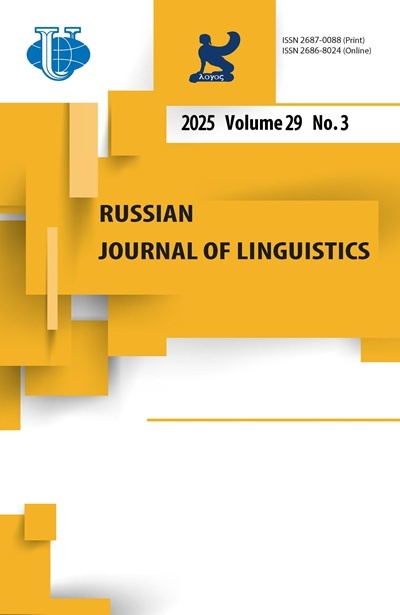Поиск
Выпуск
Название
Авторы
|
Кириллова А.А. |
|
Борисова А.А., Ильина Н.Ю. |
|
Спиркин А.Л. |
|
Яэ С. |
|
Силашки Н., Джурович Т. |
|
Мельчук И.А. |
|
Абрамов А.В., Иванов В.В. |
|
Аль-Салман С., Хайдер А.С. |
|
Романов А.А., Новоселова О.В. |
|
Била М., Ванькова И. |
|
Зализняк А.А., Падучева Е.В. |
|
Пенчева А. |
|
Цветков Г.Н. |
|
Ивашкевич И.Н. |
|
Платонова Е.А. |
|
Боброва Е.Д. |
|
Елисеев В.С. |
|
Тарасенкова Ю.В. |
|
Кургузёнкова Ж.В. |
|
Виджаянто А. |
|
Парк Д. |
|
Комалова Л.Р., Калюжная Л.В. |
|
Фендри Э., Трики М. |
|
Забродская А., Иванова О. |
|
Нелюбова Н.Ю., Сёмина П.С., Казлаускене В. |
|
Амирдаббагхьян А., Шангита Р.К. |
|
МИЛОСЛАВСКИЙ И.Г. |
|
Виимаранта Х., Протасова Е., Мустайоки А. |
|
Диуф Алиу -. |
|
Найденова Н.С. |
|
Федотова Т.В. |
|
Попова Н.В. |
|
Сагдуллина Е.В. |
|
Беляева И.С. |
|
Диас-Вера Х.Е. |
|
Леонтович О.А., Котельникова Н.Н. |
|
Путята Г. |
|
Еленевская М., Протасова Е. |
|
Лаврова Н.А., Никулина Е.А. |
|
Магфорд Г. |
|
Кабал-Гуарро М. |
|
Терентьева Е.Д. |
|
Махмуд Ашрафи Рад M. |
|
Грибанов И.С. |
|
Найдёнова Н.С. |
|
Багана Ж., Бондаренко Е.В., Чернова О.О. |
|
Терехова Е.В. |
|
Киынова Ж.К. |
|
Литягина Е.А. |
|
Найденова Н.С. |
|
Девечи Т. |
|
Хайне Б., Ян В., Ри С. |
|
Москвичёва С.А., Вио А., Замалетдинов Р.Р. |
|
Богинская О.А. |
|
Алеми М., Пазоки Моахар Н., Резанежад А. |
|
Фернандес-Амайя Л. |
|
Шаров К.С. |
|
Ольнова М. |
|
Смирнитская А.А. |
|
Солдатова О.С. |
|
Василенко Л.Ю. |
|
Изотов А.И. |
|
Осипова М.П. |
|
Усманова З.А. |
|
Озюменко В.И. |
|
Романов А.С. |
|
Григорьева А.А., Бергельсон М.Б. |
|
Шайбакова Д., Протасова Е., Еленевская М. |
|
Тазик Х., Аликбари М. |
|
Хедри М., Хасан И., Критсис К. |
|
Вежбицкая А. |
|
Цанне А., Сифиану М. |
|
Маис-Аревало К. |
|
Сурьянараян Н. |
|
Егорова К.Г., Ан Сан Чоль -. |
|
Немов А.А. |
101 - 176 из 176 результатов
<< < 1 2
Подсказки:
- Ключевые слова чувствительны к регистру
- Английские предлоги и союзы игнорируются
- По умолчанию поиск проводится по всем ключевым словам (агенс AND экспериенцер)
- Используйте OR для поиска того или иного термина, напр. образование OR обучение
- Используйте скобки для создания сложных фраз, напр. архив ((журналов OR конференций) NOT диссертаций)
- Для поиска точной фразы используйте кавычки, напр. "научные исследования"
- Исключайте слово при помощи знака - (дефис) или оператора NOT; напр. конкурс -красоты или же конкурс NOT красоты
- Используйте * в качестве версификатора, напр. научн* охватит слова "научный", "научные" и т.д.












